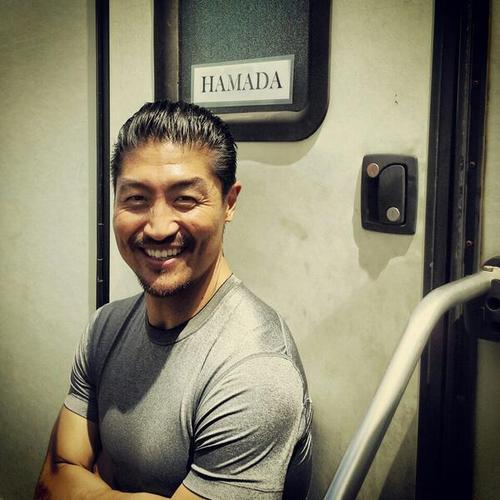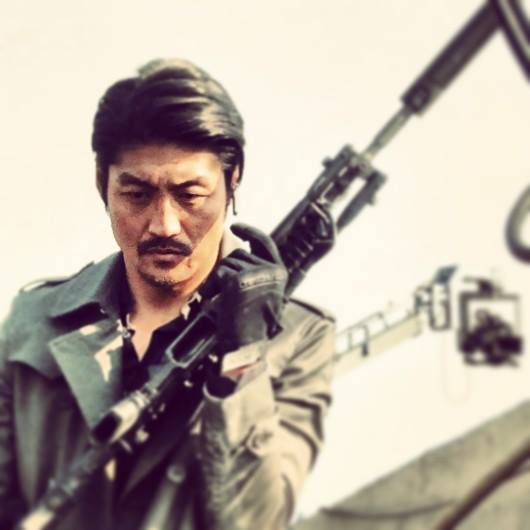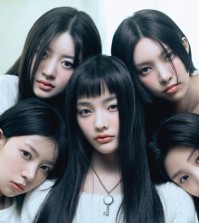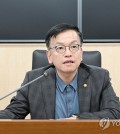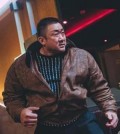- California Assembly OKs highest minimum wage in nation
- S. Korea unveils first graphic cigarette warnings
- US joins with South Korea, Japan in bid to deter North Korea
- LPGA golfer Chun In-gee finally back in action
- S. Korea won’t be top seed in final World Cup qualification round
- US men’s soccer misses 2nd straight Olympics
- US back on track in qualifying with 4-0 win over Guatemala
- High-intensity workout injuries spawn cottage industry
- CDC expands range of Zika mosquitoes into parts of Northeast
- Who knew? ‘The Walking Dead’ is helping families connect
‘Jurassic World’ actor Brian Tee feels ‘career starting to hit stride’
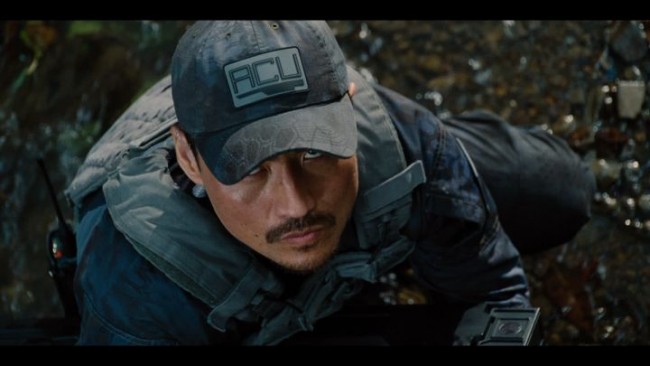
Brian Tee in Universal Pictures’ upcoming Hollywood blockbuster “Jurassic World” as Katashi Hamada. “He’s head of security for the park that they’ve opened in the movie Jurassic World,” said Tee. (Courtesy of Lisa DiSante-Frank)
By Brian Han
Actor Brian Tee is on his way back to the silver screen in Universal Pictures’ “Jurassic World” as Katashi Hamada, “a greying Japanese badass” according to a snapshot of the script from JurassicWorld.org.
As of late he has been playing significant roles in more and more blockbusters, but by no means is he even beginning to feel jaded.
“For an artist, working on big budget films is like being on a playground,” Tee said with a grin. “Honestly, I feel like a kid again being in movies with dinosaurs and mutants with super powers.”
In fact, many of his roles resonate with fond childhood memories.
“I grew up watching ‘Jurassic Park’,” the actor said. “And being a part of ‘The Wolverine’ brought back memories of Halloween when I was 10. I remember making my ‘Adamantium’ claws out of cardboard and aluminum foil.”
Even with an increasingly impressive track record, Tee still doesn’t feel quite like he’s made it.
“I think that’s just the nature of the business,” he explains. “You’re only really as good as your last job and as a result I’m not going to focus on some imaginary benchmark. With each role I want to grow, change and expand my skill set. I want to take on roles that matter and try to change the scope of Asian Americans in this industry especially. That’s my goal.”
It’s a lofty one, but considering his background and experience, Tee seems like a fitting candidate to help reshape Hollywood’s sometimes outdated perception of Asian cultures in America.
The 37-year-old is of Korean and Japanese descent and takes advantage of his familiarity with both cultures to expand his repertoire of roles.
“In my 15 year career so far, I’ve played characters that are Korean, Japanese, Cambodian, Chinese and so on,” Tee said. “I fully understand that each Asian culture offers something unique and that in some cases there are overlapping and conflicting histories. In America, Asian Americans certainly have a voice and if we can somehow make it much more united I think we would all be better off. I’m a perfect example of two cultures that traditionally do not get along with each other and I’m just a blend of the two.”
This ideology may be a bit too forward-thinking for older or more traditional demographics as illustrated by Korea’s and Japan’s lasting tensions over the latter’s controversial World War II practices, but his point is that there’s an attainable middle ground especially in the context of a modern day U.S.
“When I was growing up in Hacienda Heights [L.A. County], I had Korean friends, Chinese friends, Japanese friends, Mexican friends, black and white friends,” recalls Tee. “Maybe that’s just the culture of the suburb, but we all just grew up together and had fun together and that was it. That’s just the reality I was presented with as a kid and so I believe it can work on a larger scale.”
Despite his melting pot American upbringing, Tee was born in Okinawa, Japan as Jae-bum Takata — a combination of traditional Korean and Japanese names.
He knew that tension was supposed to exist between the two cultures, but never really experienced it growing up.
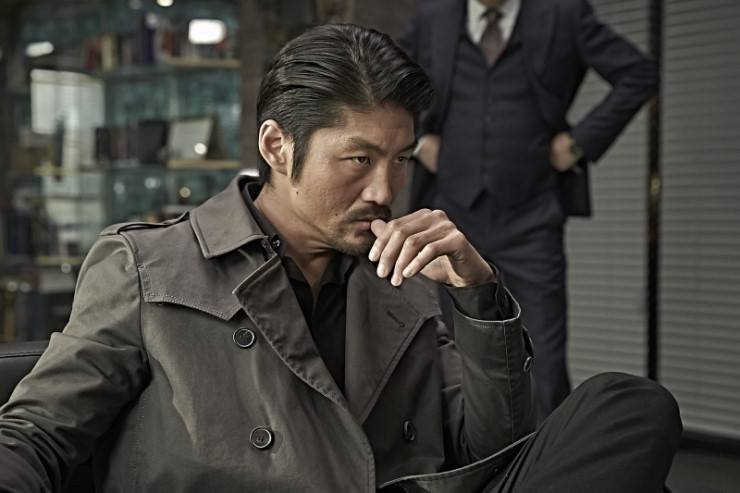
Brian Tee as Chinese American hitman Chaoz in the Korean film “No Tears for the Dead” (Courtesy of CJ Entertainment)
“I knew it existed,” Tee explains. “I always felt like I was a special case. My mom was very open minded. She was a reporter for some Korean news agency. They ousted her from reporting in the Vietnam War because she was a woman so she left for Okinawa to pursue her work and her artistry.”
His father was born in the states and went to Lincoln High School in Los Angeles.
“I think he felt less exposed to the traditional cultural conflict so that’s why it worked and they fell in love,” Tee said.
As for his given last name, Takata, Tee recalls an interesting confrontation right after graduating from the University of California, Berkeley as a theater major that led him to change it to something more culturally ambiguous.
“It happened when I was first starting out and this is a time when actors usually try anything and everything,” he said. “There was this student film with a Korean director. He was asking for people to come in and read for a Korean character. He looked at my resume and sees the last name Takata then says, ‘You’re not Korean.’”
After feeling a bit taken aback, Tee tried to explain why he would be a good fit regardless of his name.
“I’m half-Korean, my Korean mom had a strong presence in my life and I understand Korean culture,” he told the director. “I mean, this character’s supposed to be Korean American anyway and I grew up in L.A.”
It was of no use.
Tee was asked to leave the audition without a chance to show what he could offer.
It seemed that if a college student was going to reject him based on a name, he might as well make some changes in case he ran into any similar issues in the future.
“I changed it so I could give myself more opportunities,” Tee explained. “I didn’t want to be prejudged prior to showing my skills just because of a name. It was mostly a career move.”
Fittingly enough, there is now a demand for the actor in the Korean film industry.
He most recently took on a lead role alongside well-known Korean actor Jang Dong-gun in Lee Jeong-bum’s 2014 feature film “No Tears for the Dead.”
“I’m a huge fan of Korean cinema so it was an honor to work with those guys and it was such an amazing experience,” Tee said. “There were a lot of translators on set, but I’m proficient in Korean so I could understand about 70 percent of what they were saying. We all spoke pretty freely. It never felt like it slowed down the process.”
Although there are many differences between how Hollywood and Korean film productions operate, one quality stands out in Tee’s mind.
“For some reason there is still this old school idea in Hollywood, which is changing, that portrays Asian males as reserved, never showing emotion, and that’s good for certain situations and character types,” he said. “But after awhile it becomes a caricature.”
After venturing outside of the world’s entertainment capital, Tee found a creative freedom that he couldn’t elsewhere.
“Korean cinema is the exact opposite of that,” he says in comparing the two industries. “They want you to emote and express and feel. It’s shown throughout a lot of their work, and audiences respond to that. Hopefully that will transfer into Hollywood and it already has on some level.”
Tee continues to spread this progressive attitude through his work and that’s good news considering that he feels his acting career is just starting to blossom.
“I really and truly love acting,” Tee said as he reflected on his career. “If it’s one thing I can tell other aspiring actors is that you need to love it, love it more than anything. I don’t say that lightly because there are so many pitfalls, rejections and disappointments and it’s that love that pushes you to stick with your craft. I think I can say I’ve lived that and I still am. I feel like my career is starting to hit its stride and we’ll see where that takes me.”







